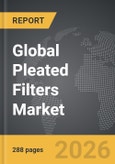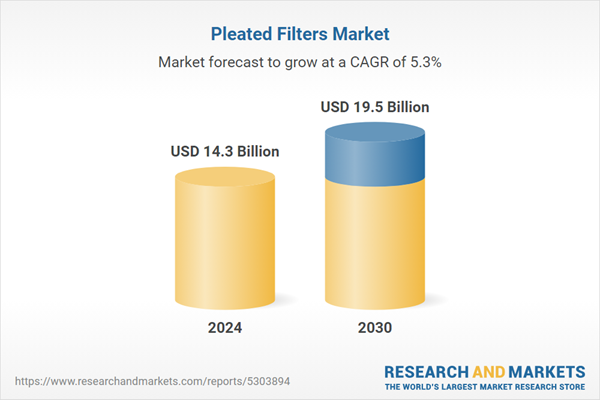Global Pleated Filters Market - Key Trends & Drivers Summarized
What Are Pleated Filters, And Why Are They Gaining Popularity Across Industries?
Pleated filters are designed with folded filter media that increases the surface area for capturing airborne particles, offering high-efficiency filtration for a wide range of applications. These filters are increasingly being adopted across various industries due to their ability to trap fine dust, allergens, and other contaminants while maintaining low airflow resistance. The pleated design allows for longer operational life compared to traditional flat filters, reducing maintenance costs and improving air quality in sectors such as HVAC systems, automotive, industrial processing, and healthcare.In HVAC systems, pleated filters have become a critical component for improving indoor air quality in residential, commercial, and industrial buildings. With the rising focus on energy efficiency, pleated filters enable better airflow while maintaining filtration efficiency, thereby lowering energy consumption. The medical and healthcare sectors also benefit from pleated filters in environments such as hospitals and laboratories where air purity is essential. Their ability to filter out airborne pathogens and particles makes them ideal for sterile and sensitive environments. As environmental and health standards become stricter globally, pleated filters are becoming indispensable for industries seeking high-performance filtration solutions.
How Are Technological Advancements Enhancing Pleated Filters?
Technological innovations are significantly enhancing the performance and application of pleated filters. Advances in filter media, such as the use of synthetic and nano-fiber materials, have improved the dust-holding capacity and filtration efficiency of pleated filters. These materials offer superior durability, moisture resistance, and chemical stability, making them suitable for demanding environments such as chemical processing plants and power generation facilities. The development of electrostatically charged filter media has also boosted the capture rate of sub-micron particles, which is particularly important in sectors like healthcare, where preventing the spread of airborne infections is critical.In addition, self-cleaning and regenerative technologies are emerging in industrial pleated filters, especially in applications involving high dust loads. These filters automatically clean or regenerate themselves, reducing downtime and extending the lifespan of the filtration system. Another key innovation is in sustainable filter materials, as manufacturers are increasingly focusing on recyclable and biodegradable options in response to growing environmental concerns. These eco-friendly pleated filters help industries reduce waste and comply with environmental regulations, making them attractive for environmentally conscious organizations.
Why Are Different Sectors Increasingly Relying on Pleated Filters?
Various industries are adopting pleated filters due to their adaptability and effectiveness across multiple applications. In the HVAC industry, the growing demand for improved indoor air quality (IAQ) is driving the adoption of pleated filters in residential, commercial, and industrial buildings. These filters help reduce allergens, dust, and pollutants, contributing to healthier living and working environments. Moreover, governments and regulatory bodies are implementing stricter air quality standards, especially in urban areas, prompting businesses to upgrade their filtration systems with pleated filters to meet compliance standards.The automotive industry is another major consumer of pleated filters, particularly in the form of cabin air filters. As awareness of air pollution and its health effects grows, there is an increasing demand for effective air filtration in vehicles. In industrial applications, such as manufacturing plants, refineries, and power generation facilities, pleated filters are essential for maintaining equipment efficiency and ensuring worker safety by removing dust, particulates, and hazardous airborne substances. Additionally, the food and beverage industry relies on pleated filters for air and liquid filtration to maintain product purity and meet stringent health and safety regulations. The versatility of pleated filters makes them a preferred choice across these diverse sectors.
What Factors Are Driving Growth in the Pleated Filters Market?
The growth in the pleated filters market is driven by several factors, each contributing to the increasing demand for high-performance filtration solutions. First, the rising awareness of indoor air quality and its impact on health is a significant driver, especially in residential, commercial, and industrial buildings. As air pollution levels rise, consumers and businesses are investing in filtration systems that can remove pollutants, allergens, and pathogens, making pleated filters a critical component in maintaining clean air.Technological advancements are another key driver. The development of more efficient and durable filter media, such as nano-fiber and synthetic materials, has enhanced the performance of pleated filters, enabling them to capture smaller particles while maintaining lower airflow resistance. This is particularly important in industries that require high-efficiency particulate air (HEPA) filtration, such as healthcare and pharmaceuticals. The automotive industry is also a major contributor to market growth, as the demand for cabin air filters increases in response to consumer preferences for healthier, cleaner in-vehicle environments.
Furthermore, growing environmental awareness and sustainability initiatives are shaping the market. Manufacturers are increasingly focusing on producing eco-friendly pleated filters made from recyclable materials, appealing to industries that are under pressure to reduce their environmental footprint. Lastly, the adoption of stricter regulations on air quality and emissions control across industries is pushing businesses to invest in advanced filtration systems, further driving the demand for pleated filters. This combination of health, environmental, and regulatory factors is fueling robust growth in the pleated filters market.
Report Scope
The report analyzes the Pleated Filters market, presented in terms of market value (US$ Thousand). The analysis covers the key segments and geographic regions outlined below.- Segments: Product Type (Air Filters, Food & Beverage Filters, Oil Filters, Other Product Types); Application (Food & Beverage, Industrial, Chemicals & Petrochemical, Oil & Gas, Power Generation, Electronics, Other Applications).
- Geographic Regions/Countries:World; United States; Canada; Japan; China; Europe (France; Germany; Italy; United Kingdom; Spain; Russia; and Rest of Europe); Asia-Pacific (Australia; India; South Korea; and Rest of Asia-Pacific); Latin America (Argentina; Brazil; Mexico; and Rest of Latin America); Middle East (Iran; Israel; Saudi Arabia; United Arab Emirates; and Rest of Middle East); and Africa.
Key Insights:
- Market Growth: Understand the significant growth trajectory of the Air Filters segment, which is expected to reach US$9.7 Billion by 2030 with a CAGR of a 5.4%. The Food & Beverage Filters segment is also set to grow at 6% CAGR over the analysis period.
- Regional Analysis: Gain insights into the U.S. market, valued at $3.7 Billion in 2024, and China, forecasted to grow at an impressive 8.4% CAGR to reach $4.5 Billion by 2030. Discover growth trends in other key regions, including Japan, Canada, Germany, and the Asia-Pacific.
Why You Should Buy This Report:
- Detailed Market Analysis: Access a thorough analysis of the Global Pleated Filters Market, covering all major geographic regions and market segments.
- Competitive Insights: Get an overview of the competitive landscape, including the market presence of major players across different geographies.
- Future Trends and Drivers: Understand the key trends and drivers shaping the future of the Global Pleated Filters Market.
- Actionable Insights: Benefit from actionable insights that can help you identify new revenue opportunities and make strategic business decisions.
Key Questions Answered:
- How is the Global Pleated Filters Market expected to evolve by 2030?
- What are the main drivers and restraints affecting the market?
- Which market segments will grow the most over the forecast period?
- How will market shares for different regions and segments change by 2030?
- Who are the leading players in the market, and what are their prospects?
Report Features:
- Comprehensive Market Data: Independent analysis of annual sales and market forecasts in US$ Million from 2024 to 2030.
- In-Depth Regional Analysis: Detailed insights into key markets, including the U.S., China, Japan, Canada, Europe, Asia-Pacific, Latin America, Middle East, and Africa.
- Company Profiles: Coverage of players such as Absolent Group, Airex Filter Corporation, Camfil, Clarcor Air Filtration, Columbus Industries, Inc. and more.
- Complimentary Updates: Receive free report updates for one year to keep you informed of the latest market developments.
Some of the 36 companies featured in this Pleated Filters market report include:
- Absolent Group
- Airex Filter Corporation
- Camfil
- Clarcor Air Filtration
- Columbus Industries, Inc.
- Denso Corporation
- Donaldson Company, Inc.
- Filtration Group
- Freudenberg
- Honeywell
- Koch Filter
- Spectrum Filtration Pvt. Ltd.
- Tex-Air Filters
- The National Filter Media Corporation (Midwesco Filter Resources Inc)
- Troy Filters Ltd.
This edition integrates the latest global trade and economic shifts into comprehensive market analysis. Key updates include:
- Tariff and Trade Impact: Insights into global tariff negotiations across 180+ countries, with analysis of supply chain turbulence, sourcing disruptions, and geographic realignment. Special focus on 2025 as a pivotal year for trade tensions, including updated perspectives on the Trump-era tariffs.
- Adjusted Forecasts and Analytics: Revised global and regional market forecasts through 2030, incorporating tariff effects, economic uncertainty, and structural changes in globalization. Includes historical analysis from 2015 to 2023.
- Strategic Market Dynamics: Evaluation of revised market prospects, regional outlooks, and key economic indicators such as population and urbanization trends.
- Innovation & Technology Trends: Latest developments in product and process innovation, emerging technologies, and key industry drivers shaping the competitive landscape.
- Competitive Intelligence: Updated global market share estimates for 2025, competitive positioning of major players (Strong/Active/Niche/Trivial), and refined focus on leading global brands and core players.
- Expert Insight & Commentary: Strategic analysis from economists, trade experts, and domain specialists to contextualize market shifts and identify emerging opportunities.
Table of Contents
Companies Mentioned (Partial List)
A selection of companies mentioned in this report includes, but is not limited to:
- Absolent Group
- Airex Filter Corporation
- Camfil
- Clarcor Air Filtration
- Columbus Industries, Inc.
- Denso Corporation
- Donaldson Company, Inc.
- Filtration Group
- Freudenberg
- Honeywell
- Koch Filter
- Spectrum Filtration Pvt. Ltd.
- Tex-Air Filters
- The National Filter Media Corporation (Midwesco Filter Resources Inc)
- Troy Filters Ltd.
Table Information
| Report Attribute | Details |
|---|---|
| No. of Pages | 288 |
| Published | February 2026 |
| Forecast Period | 2024 - 2030 |
| Estimated Market Value ( USD | $ 14.3 Billion |
| Forecasted Market Value ( USD | $ 19.5 Billion |
| Compound Annual Growth Rate | 5.3% |
| Regions Covered | Global |









